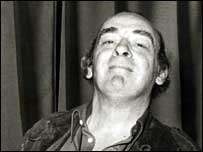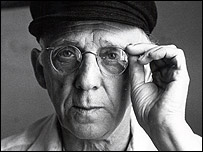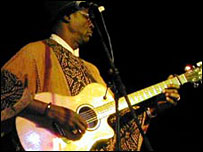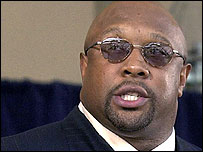 This Is Not A
BLOG!
This Is Not A
BLOG!
Date: 07/03/06
Too Many Goodbyes
It's not been a good couple of hours.
I get home after a day spent wrestling with software that won't
work because of what I call 'The Curse Of XP', i.e. permissions
issues.
I turn the television on while I'm waiting for my chicken chow mein
to cook.

The name probably won't mean a lot to youngsters, but in the 1960s
and 70s, John Junkin was a regular sight and sound on radio and
television, where he was a noted actor and scriptwriter. My own best
memories of him come from the 1970s BBC radio sketch show Hello
Cheeky, a quick-fire scattergun of mad situations and groanful puns
concocted by Junkin, Barry Cryer, Tim Brooke-Taylor and musician Denis
King. A couple of favourite moments:
"Home Hints for the Handyman, Number...Please Yourself: How To
Entertain A Party Of Forty;
buy her two large gins and a packet of crisps."
"Red sky at night, shepherd's delight.
Red sky in the morning, Hendon's on fire."
**********
I had no sooner got past this, when I saw another headline marking the
passing of Ivor Cutler.

To describe Ivor Cutler as a poet would be to narrow the man. Of
course, to describe him as a 'cult poet' (see link) is merely to insult
him, being another way of saying "Who? What? I don't understand".
His off-beat songs and monologues (often accompanied by a clanky old
harmonium) weren't 'odd'; they were simply the wanderings of a rich
imagination, further fuelled by a happy (or, given his often mournful
countenance, a lugubrious) knack for a memorable phrase.
An example: in one of the Glasgow Dreamer pieces that he
did in session for John Peel, he describes staying with his
grandparents when he was about three. Early in the morning, he saw his
grandfather walking around their tenement flat naked from the waist
down. Ivor describes the old man's "fluted scrotum". Not just a
vivid image, this: only last night I recalled this phrase and thought
that Fluted Scrotum would make a great name for a band.
**********

Most people who have heard of him will probably only remember his Talking
Timbuktu album, made with Ry Cooder, but my encounter with his
music pre-dates that by nearly half a decade.
I'd been listening to John Peel (how often his name crops up
still!) for a few years, but had never quite 'got' his enthusiasm for
African music. His taste was mostly for southern African music (The
Bhundu Boys, for example), but one sticky summer's evening in 1990, he
played a track from Touré's latest album The River. I
lay there on my bed transfixed as this combination of Malian guitar and
jazz saxophone weaved its way around my head. A couple of years later,
I went out and bought the album (the first I'd ever bought by an
African musician). The track that Peelie played that night, Ai
Bine, remains one of my all-time favourites of any genre.
You can here an all-too-brief clip from it here.
**********
It must be said in all fairness that Junkin, Cutler and
Touré had all reached a ripe old age. The same could hardly be
said of the man news of whose death reached me via e-mail from my
friend Susan in Minneapolis just an hour or so ago.

Kirby
Puckett was a legend in modern baseball. A kid from the housing
projects of Chicago, he was drafted by the Minnesota
Twins in 1982, and became a regular in the team within two years.
He played for no other team in a twelve-year career which was shortened
by becoming blind in one eye through glaucoma in 1996.
During that time, he became one of the greatest ever Twins, and
still leads the club for hits, doubles, total bases, at-bats and runs.
He helped the Twins to two World Series and they won them both, in 1987
and 1991.
I'd got into baseball in the summer of 1987, through lying awake at
night listening to broadcasts of the game via the Armed Forces Network
broadcasting out of (West) Germany. After a few weeks of this, which
had started out as simply a case of wanting something to listen to at
that hour, I became hooked on the game. When I felt that I had to pick
a team to follow, because of Susan (although we'd lost touch at that
point), it really couldn't be any other than the Twins. Not bad timing,
as the Twins went all the way to The Big Show that year, and took the
title in a thrilling seven-game series against St.Louis.
Four years later, and there they were again. And there was Kirby
Puckett again. In a World Series for the ages against Atlanta, the
Twins came into Game 6 trailing. Before the game, Puckett said to his
team, "Get on my back - I'll carry you".
In the bottom of the eleventh inning, with the score tied 3-3,
Kirby came to the plate. After taking a few pitches (unusual for a man
who said of himself, "I never saw a pitch I didn't like"), the
Braves' pitcher hung one up. Seconds later, the ball was flying over
the wall in left center field. Yes, there would be a Game
Seven. In a series for the ages, there would be a game for the
ages; a nail-biting, nerve-shredding pitching duel, with Jack Morris
pitching ten shut-out innings before Gene Larkin's single to left
brought the winning run home. But, as I lay there in my bed, at about
4.30 on a chilly October morning, weeping for joy, I knew it was Kirby
who had got them there. And as I sit here now, trying hard not to weep
for a different reason (and not entirely succeeding), I recall that it
was Kirby Puckett, the enthusiastic, the stylish, the committed, who
helped make me a baseball fan.
And I'm grateful, Kirby. Very grateful. Thanks for the good times.




 This Is Not A
BLOG!
This Is Not A
BLOG!











